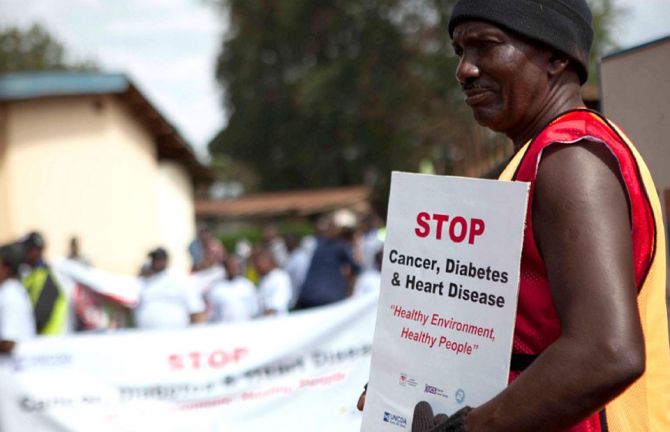

Feature Story
Learning lessons from the AIDS response to control NCDs
27 September 2018
27 September 2018 27 September 2018Noncommunicable diseases (NCDs) are by far the biggest killers of people worldwide, responsible for 71% of all deaths globally. Defined by the World Health Organization as diseases of long duration and generally slow progression, the four main types of NCDs, which account for 80% of all NDC premature deaths, are cardiovascular diseases, cancer, chronic respiratory diseases and diabetes.
People of all ages can be affected by NCDs, but they tend to affect older people. With increasing numbers of people living with HIV accessing treatment and hence living longer, people living with HIV are increasingly falling ill with NCDs. Being HIV-positive, however, also increases the risk of developing NCDs, either because of the infection itself or owing to side-effects of the medicines used to treat HIV. The care that people living with HIV receive therefore increasingly needs to include care for NCDs.
Since people in many low- and middle-income countries are smoking more, drinking alcohol more and becoming less active, and their diets are changing, rates of NCDs are increasing. Age-adjusted death rates from NCDs are nearly twice as high in low- and middle-income countries as in high-income countries.
However, the successes to date in the AIDS response show what can be done if countries take decisive action. It is becoming increasingly clear that if the world is to control NCDs, the lessons of the AIDS response need to be learned and applied to the response to NCDs.
Health-care systems in regions that are home to most people living with HIV were designed to primarily address acute, rather than chronic, illnesses. However, HIV programmes in those same countries can be good models for how to step up services for NCDs, showing how to provide continuity of care, support adherence to treatment and engage communities.
The AIDS response has had a huge impact on global health. The impact of early diagnosis and treatment, HIV services being in many countries the entry point for broader health services, the importance of tackling poverty and other social determinants of health, raising community awareness and creating demand for services, the importance of putting civil society and communities in the centre, with their engagement, activism, advocacy and mobilization—these are all key lessons from the AIDS response that can guide the response to NCDs.
“The response to HIV has shown that the impossible is possible,” said Michel Sidibé, the Executive Director of UNAIDS. “UNAIDS will work with our partners in the United Nations system to share best practices from the AIDS response to guide countries, communities and other partners.”
As part of the world’s effort to combat NCDs, on 27 September countries will come together in New York, United States of America, at the United Nations for the Third High-Level Meeting on the Prevention and Control of Noncommunicable Diseases. UNAIDS is a part of the United Nations Interagency Task Force on the Prevention and Control of Noncommunicable Diseases and will be sharing its knowledge at the high-level meeting.



